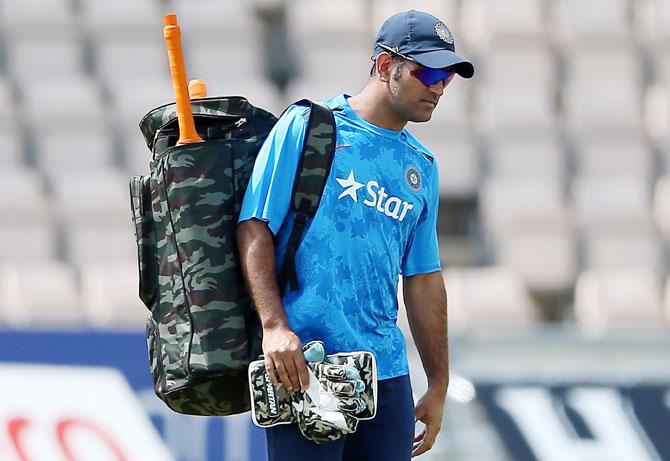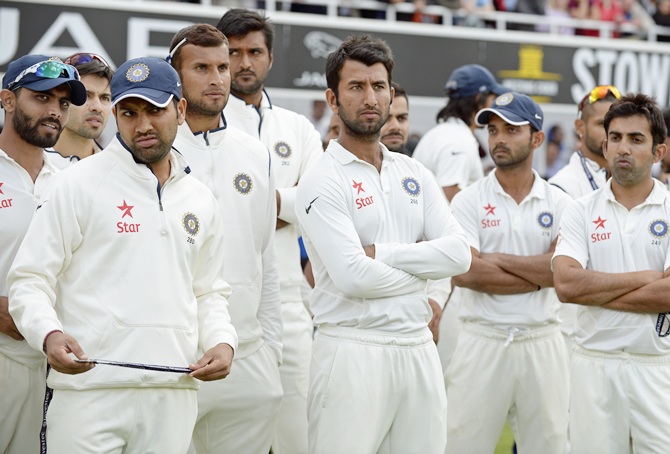 | « Back to article | Print this article |
Why Team India is dominant at home, but dominated abroad
Technical flaws go unnoticed when the team plays at home. On tour, the players become susceptible. The just-concluded England Test series, says Bikash Mohapatra, points to the fact that this Indian side doesn’t have a player who can adapt and alter his game accordingly.
When Team India wins it is history. When it loses it is humiliation!
Those who went bonkers after the team won the second Test against England at Lord's, to take a lead in the five-Test series, are now going overboard in criticising it.
The series loss was disappointing alright, but wasn't unexpected.
Keeping emotions at bay, if one is willing to see reason, it will take few minutes of research to find out that not much goes in India's favour when it comes to the five-day format.
Don't miss our coverage of India's tour to England
Please click NEXT to read more...
Why Team India is dominant at home, but dominated abroad
For a country that first played in 1932, India’s Test record flatters to deceive.
When you read headlines like 'India's first Test win at Lord's in 28 years' or 'Only India's second ever win at the home of cricket'... they don't befit a nation that has been playing for 84 years. It reeks of complacency, a reluctance to learn or adapt.
It is a fact that we still have a negative record against five countries: England, Australia, South Africa, Pakistan and the West Indies. Just to remind you, only four other countries play Test cricket.
Take just the overseas record into account, and we can add another couple of entries (New Zealand and Sri Lanka) to the above list.
While India has raced ahead when it comes to the shorter formats, in the game's classical version the team is still crawling. The initial years may have been all about adaptation, but the recent ones have been about trepidation.
In the last two decades or so the Indian cricket board (BCCI) has become the most powerful entity in the sport. However, that doesn't mean the Indian team has become the best. In fact, the stakes are so high that it has worked to the team’s disadvantage.
Please click NEXT to read more...
Why Team India is dominant at home, but dominated abroad
Homeland security
With the BCCI calling the shots at the International Cricket Council (ICC), the Indian team gets to play more at home.
That essentially translates into placid tracks, a dependence on the toss, lot of runs, reliance on spinners and, more often than not, an Indian win (For starters, in the last 15 years, India have lost only three series at home).
It is good enough to camouflage the team's weaknesses and keep the fans happy, but exposes them during their travels. The euphoria surrounding those 'home' wins mean key issues, like the nature of wickets and fact that it restricts the growth of quality bowlers, are conveniently ignored.
It's true that every team likes to prepare wickets that suits them the best, but it is also a fact that the those in Australia, England and South Africa and far more competitive surfaces than the lifeless ones in the subcontinent.
Winning a toss might do the trick at home, but doesn't exactly work when on tour. Everyone will agree that Mahendra Singh Dhoni won a good toss at Manchester. What happened thereafter we all know.
For years, the Indian team has been dominant at home, and dominated abroad. And that is likely to be the case in the years to come.
Please click NEXT to read more...
Why Team India is dominant at home, but dominated abroad
No technicalities please
It is not just the nature of the batting surface but also the quantity of cricket played.
Sub-continent wickets ensure runs and a batsman doesn't have to make any particular adjustment. He just needs to hang around.
Add to it the fact that a bulk of the cricket the Indian team is involved in pertains to the shorter formats, where you can camouflage the deficiencies to a great extent.
It's these twin factors that have made Indian batsman complacent.
Besides, the previous generation of players had the patience to work on the flaws in their technique. The current lot lacks it.
These technical flaws go unnoticed when the team plays at home. On tour, the players become susceptible. The just-concluded series also pointed out to the fact that this Indian side doesn't have a player who can adapt and alter his game accordingly.
How many times in England did Virat Kohli get out to an away-swinger? Why did Shikhar Dhawan struggle? How many times did Ajinkya Rahane hit it straight back to the bowler?
The questions above underline the problem within. What's worse is the fact that despite the realisation, there is a reluctance to admit what is not working.
Please click NEXT to read more...
Why Team India is dominant at home, but dominated abroad
Great expectations
If the high stakes and a packed schedule put the Indian team under pressure, the expectations from fans make it worse.
In a country starved of sporting success, where one major achievements on the field can be counted on fingertips, cricket is often seen as lone option to offer succour. Not because it is the world’s best team, but because there's no alternative.
The Indian team is always expected to win. And this expectation is a double-edged sword.
While on the one hand excessive adulation and divine status can (and does) stem arrogance, going overboard with criticism can have a negative effect.
It won't be an exaggeration to say that the Indian team is losing simply because it is afraid to lose. It's this fear that ensured the team went on the defensive immediately after taking the lead in the series.
Thereafter, it wasn't about going all out and extending that lead, but about protecting the advantage.
This negative mindset was largely responsible for the abject surrender in the England Test series.




